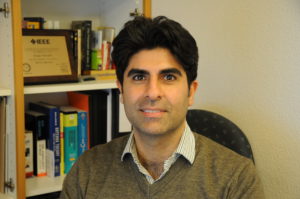In this short blog, Dr. Arya Fallahi shares his understanding and experiences on several attributes of staying in academic research and critiquing Industry as a career path for a young professional. This blog goes along with our earlier post on moving from Academia to Industry.
He earned his PhD degree from Swiss Federal Institute of Technology (ETH Zurich) in 2010, winning a prestigious ETH Medal for Outstanding PhD Thesis. After the PhD, he joined the Paul Scherrer Institute (PSI) for a two-year post-doctoral appointment in the Accelerator Modelling and Advanced Simulations (AMAS) group. In 2012, he moved to Germany to work as a computational physicist in the ultrafast optics and X-ray sources group of the Deutsches Elektronen-Synchrotron (DESY), in the Centre for Free Electron Laser Science (CFEL) in Hamburg. In January 2019, Arya joined the IT’IS Foundation as Project Leader for Computational Electromagnetics and ETH Zurich as a senior research scientist.

Let’s hear Dr. Arya’s personal narratives on this.
In 2019, I joined a unique position defined based on a collaboration between the Swiss Federal Institute of Technology (ETH Zurich) and the Foundation for Research on Information Technology in Society (IT’IS). I could enjoy performing academic research and simultaneously support industrial research and development projects at the Z43 alliance. Before that, I was involved for nine years in the national lab research environment, and before that, I was doing my Ph.D. at ETH Zurich. So, I can claim to have an extraordinary career path where I could gain experience in several different environments. Now, the question is which one is the best? Well, I can say I was and am enjoying all of them. There are lots of pros and cons to working in academia, national labs, and industry. Whether one enjoys any of the job types is very dependent on the person. Here, I would mention the differences and the main points for liking or disliking one of these career paths.
Deadlines: a difference in perspectives!
One crucial difference between academic and industrial research is deadlines. In academia, the research group itself usually defines the deadlines, and it is, of course, easy to change that. In industry, the end-users define the deadlines, and it is sometimes really impossible to change that. It means in the industry, you need to respect the timelines. In national labs, like many of the following points below, an in-between situation exists. There exist flexible deadlines, but it is not easy to change them. I like the deadlines since they help me be organized and follow my planned schedule. But, sometimes, deadlines become very stressful.
Meetings (and meetings)
In industry and national labs, you have to work in a team. Working alone is almost meaningless in such workplaces. In academia, you can have a job where you work alone and independently. I think for someone who is not a team player, looking for an industrial career path is no option. Maybe, in national labs, one can find theoretical research projects that a single person performs, but it is relatively scarce. Although I do not consider myself the best team player, I always enjoyed working in a team. Even in academic research works, I tried to work together with other scholars. That is probably the reason I never managed to have a single-author publication.
Freedom of ideas


In academia, there exists a concept that I name freedom of ideas. One needs only to be creative and come up with new ideas. Of course, they should be realistic ideas and in line with the laws of nature. In an industry as well as in national labs, ideas are not always appreciated like in academia. There exist other aspects like financial ones or end-user requirements. If the idea is very demanding or expensive to realize, the inventor may get disappointed seeing the management board not supporting the new development. In this regard, I liked the academic environment more. But, to be honest, the additional criteria in the industry are a very reasonable basis for evaluating new ideas. In the end, research needs to be serving society.
Work-life balance
Among my friends, I was always called a workaholic. I am very much used to working 50-60 hours per week and do it very regularly. We need this in academia, but in industry, the workload is typically very organized. It means that one needs to work for 40 hours per week and no more. However, if someone like me wants to work more, there are always tasks to fulfill. Thus, I would say if someone does not like intense working, industry is the correct option. In academia, one needs to be deeply fascinated by the job and enjoy spending long hours on the tasks.
Career path: what you really want to do?
Career paths in national labs and academia are very similar, but they do not enjoy the large and diverse flexibility in the industry. In academia, several other factors exist to promote which are not really in ones’ control, in addition to what you know and what you have done. Working on a hot research topic, having an influential network, the project’s success, and the availability of positions are effective on the career path. However, if you work hard in the industry, you earn what you deserve either in your own company or in another one. I liked the industrial career path more than the academic one. Indeed, this may be the main reason pushing me towards industry in my next adventure.
To summarize, all these work environments can be attractive and can be disappointing. It depends on the person to be fascinated by the positive features or annoyed by the negative ones. Of course, the personal character here plays an important role. I, as someone with a positive and easy-going attitude, enjoyed all my previous positions. Now, I like working on applied industrial projects at IT’IS foundation and, on the other hand, can think about ground-breaking ideas at ETH Zurich.
There is sometimes a wrong belief that doing a Ph.D. is not needed for industrial jobs. It may not be required, but having a PhD-type experience helps correctly figure out and solve the problems. However, by not doing a Ph.D., only the door to an exciting job market in academia is closed. I would recommend everyone do a Ph.D. and then decide where to go considering his/her attitude and the above points.
**Statements and opinions given in this blog are the expressions of the contributor(s). Responsibility for the content of published articles rests upon the contributor(s), not on the IEEE Communication Society or the IEEE Communications Society Young Professionals.

